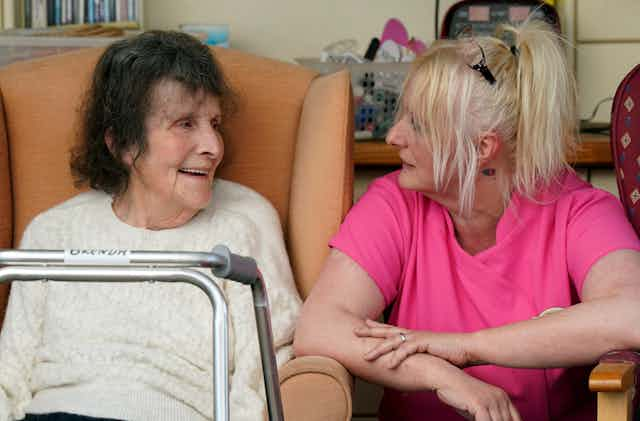Omicron cases are falling, and the UK government is focusing on a return to normal. But far from entering a post-pandemic recovery phase, the adult social care sector – which provides crucial services to people who are disabled, elderly or ill – is facing more acute pressure than ever.
Social care in England was under severe stress well before any of us had heard of COVID. Years of austerity had led to a chronically overstretched and undervalued workforce, long waiting lists for assessments and services, and unprecedented levels of unmet need. The pandemic exacerbated these problems.
This shouldn’t have come as a surprise. The British government knew that a viral pandemic was one of the greatest threats facing its population, and successive pandemic preparedness exercises had identified social care as a fault-line that could crack under pressure.
Yet the findings of planning exercises that predicted this – such as Exercise Cygnus, a pandemic simulation run in 2016 – were insufficiently addressed. When COVID arrived in early 2020, the disruption it caused quickly overwhelmed the sector’s capacity to maintain business as usual.
Now, as the COVID threat is subsiding, social care provision needs – at the very least – to return to pre-pandemic levels. But there are real concerns that this isn’t happening.
COVID required emergency legislation
By March 2020, the seriousness of the COVID situation for adult social care was becoming evident. Pressure was growing rapidly, as many care workers and unpaid carers were having to self-isolate to avoid transmitting what was clearly a deadly virus.
The Coronavirus Act 2020 therefore introduced emergency provisions that allowed local authorities increased flexibility in how they provided care and support. These “easements” to certain duties contained in the Care Act 2014 – such as the assessment of needs of adult service users and carers – provided a means to operate, legally, at reduced capacity.
At their highest levels, the easements allowed where necessary for care to be changed or withdrawn to meet more urgent needs elsewhere in the system, to “prioritise care so that the most urgent and acute needs are met” – effectively rationing services.
These easements proved controversial. Only eight local authorities formally activated them, and they then quickly reversed their decisions under sustained scrutiny and pressure from campaigners.
Other changes went under the radar
Only those local authorities that formally activated the highest levels of easements were publicly listed, but nationwide, the majority of local authorities still made changes to manage pressures. Social work moved mostly from face-to-face to online contact. Some assessments of needs and reviews were delayed or postponed. Day-care centres and activities were reduced or closed down altogether. Council staff were redeployed across roles and departments.

Yet many local authorities making these sorts of changes took the position that they had not used formal easements, but instead were just making use of the opportunity to be more flexible around how they provided care.
Crucially, as the director of adult social services at one local authority noted to us in an interview, those who made these under-the-radar changes didn’t attract the same scrutiny and pushback as those that had “followed the letter of the law” by formally registering themselves as easement councils.
No rebound yet
The legal provisions that allowed for social care easements expired in July 2021. But rather than recover, the adult social care situation has significantly worsened, not least due to a staffing crisis fuelled by pandemic burnout, Brexit, poor pay and conditions, and mandated COVID vaccines.
As the easement provisions have expired, there’s currently no emergency legislation within which councils can make transparent adjustments to mitigate for reduced workforce capacity or increased demand – despite the continuing need to do so.
“Every day we are rationing care in ways that we never have before,” Stephen Chandler, president of the Association of Directors of Adult Social Services, recently stated. He continued:
We are making incredibly difficult decisions about who gets care, how much care they get and who misses out – with obvious concerns that this will lead to people becoming isolated and, ultimately, to the loss of lives … This is now a national emergency for social care.
On December 29 2021, the government wrote to local directors of adult social services to announce some modest additional funding to address the impact of omicron. The government also acknowledged that omicron meant that local authorities were now “making extremely difficult decisions under unprecedented and exceptional pressures with limited time, resources, or information”. It accepted that councils “need greater flexibility to prioritise resource in these very challenging times”.
However, it went on to say:
We would advise you to take your own legal advice regarding any specific measures you are considering to ensure you continue to comply with your legal obligations, including those in Part 1 of the Care Act 2014.
Local authorities have effectively been left on their own, with pressures similar to those experienced earlier in the pandemic, but without the protection afforded by the Coronavirus Act 2020. While the act was initially viewed with suspicion – as a tool with which rights could be eroded – with hindsight it appears more like a pragmatic framework that had enabled decision making and accountability; flawed but now absent.
In 2020, at the peak of the COVID crisis, “rationing care” was considered the very highest level of easement, almost unthinkable and to be avoided except as a last resort. But now there are real concerns that some changes to services, envisaged as temporary adjustments, may persist and be accepted as the new normal for adult social care. This leaves a very challenging legacy.
It’s crucial that any changes to adult social care are subject to proper consultation and accountability. Changes that have persisted must be properly scrutinised and mustn’t be allowed to slip through just because of COVID. On top of this, the pandemic has underlined just how badly stretched the social care sector is, and how urgently the problem of under-resourcing needs to be fixed.

